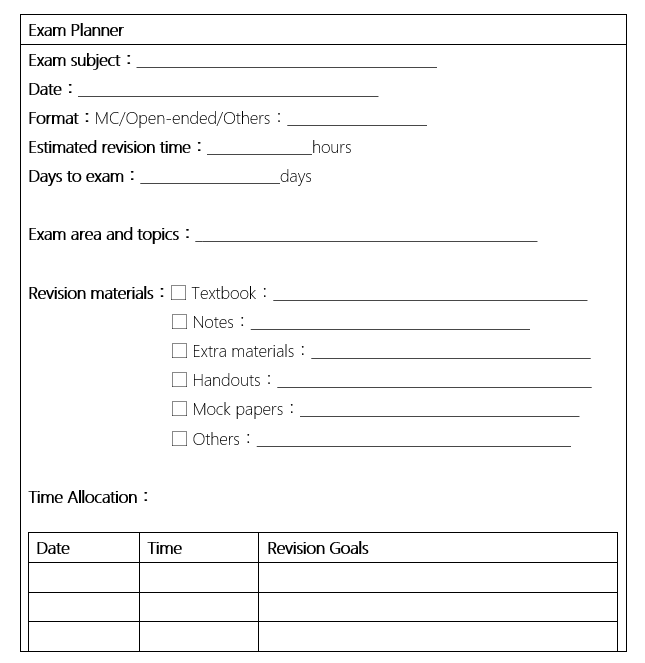
Exam Fighter
University education emphasizes active learning and encourages students to read more. Most universities recommend students to spend at least 2-3 hours on reading/assignments for each hour of class. In other words, lectures and self-learning are inevitable if you want to get good grades in exams. Of course, a detailed study plan goes a long way.
To avoid “last-minute cramming” before exams, here are some study tips! Start preparing for the midterm and final exams early!
Ask Yourself
Do you leave everything until the last minute?
- Most university students are very busy. Tutorials, presentations, assignments, activities and part-time jobs are all part of their lives. If you want to do well in exams, you need a comprehensive study plan. You can make use of the Exam Planner to list all your exam dates and time, and assign revision slots to each subject.
Are you lost as to where to start revising?
- Try to divide the exam area into smaller parts, and go through them one by one.
- If there is too much to revise, focus on the more important material first.
Do you always burn the midnight oil?
- Sleep helps our brain consolidate new knowledge and memories that we’ve learned while awake, assisting us in mastering the content we’ve reviewed. Burning the midnight oil will backfire instead.
- During exam period, you should sleep early and maintain a balanced diet. Moderate exercise also helps to maintain a clear mind and boost learning power.
Do you find it hard to be motivated to study?
- First, we need to understand the reason behind feeling tired and bored:
- Unclear or unrealistic study goals, leading to feelings of frustration
- To stay motivated, you must set realistic study goal
- Losing interest in the content
- Separate similar subjects when you study to avoid confusion and monotony
- Studying for too long at one time
- Take a short break of 10 minutes at hourly intervals
- Feeling not recognized and unappreciated, lack of rewards
- Give yourself a treat (e.g. afternoon tea) when you finish the task
- Place self-motivating and inspiring quotations/ messages in your study area
- Unclear or unrealistic study goals, leading to feelings of frustration
Prepare Yourself
- Set your study plan early with the Exam Planner

- Review past papers’ formats
- Before your exam……
- Study your homework, tests and exams as well as notes and textbooks.
- Get enough sleep to ensure a clear mind. Revising overnight will only make you tired and nervous.
- Prepare the necessary stationery.
- Double-check your exam venue, date and time.
- Arrive at the exam venue well in advance of the starting time.
Living with Exam-related Stress
- Even when you’re busy preparing for an exam, remember to exercise moderately, have some fun, maintain a healthy diet and get enough sleep.
- Beware of negative thoughts that lead to fear and worry. Try to reaffirm and encourage yourself by saying things like ‘I’ve done well in assignments and the midterm exam. This exam won’t be a problem’ or ‘I’ll try my best and not worry about how tough the exam may be, or the results’.
- Focus on how much you’ve revised already instead of how much you haven’t.
- If you haven’t done too well in one subject, move on to the next and don’t look back with regret.
Exams are indispensable experiences and challenges on the path of learning. While scores are important, the more important aspects are the perseverance, self-discipline, and ability to surpass oneself that we cultivate in the process of preparing for and taking the exams. These character traits are the most precious assets we can gain for our life journey. With a calm and composed mindset, and thorough preparation, you can achieve a performance that will not leave you with regrets.




